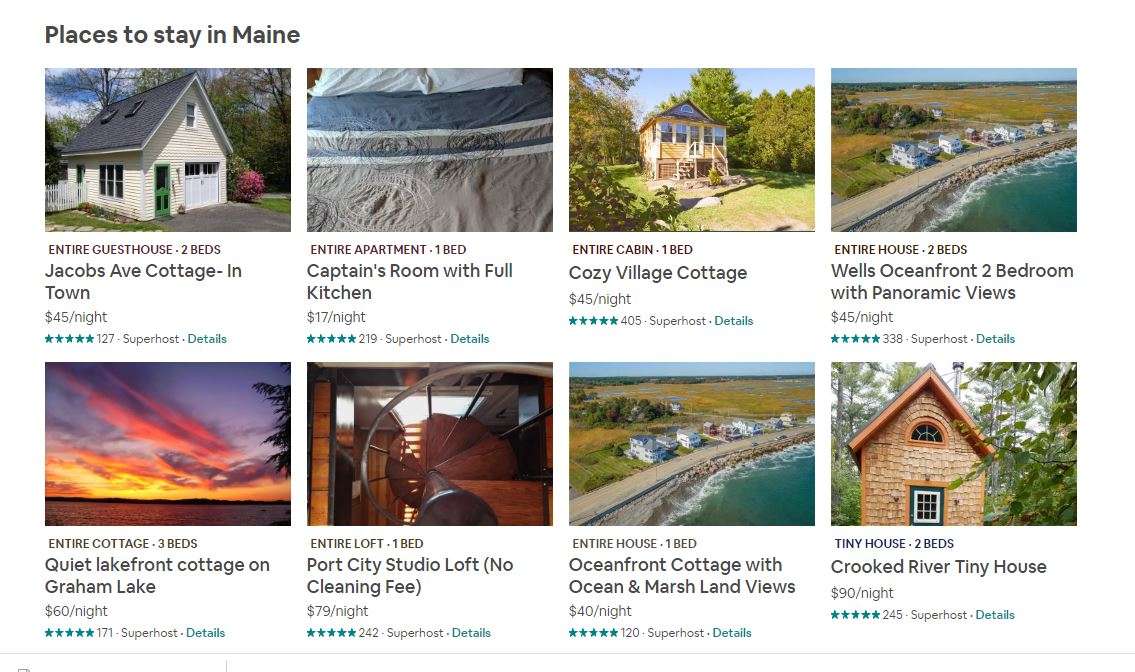
As weather cools down, short-term rental landscape in Maine stays hot
Last winter, Maine Airbnb hosts welcomed about 39,000 vistitors and generated $5.3 million in supplemental income, and a trend toward increasing use of short-term rentals in rural areas could mean bigger numbers in the state this year.
According to an Airbnb survey, use of the listing service is on the rise in 13 states where at least 35% of the population lives in states rural areas as classified by the U.S. Census. Maine is the most rural of the 13 states, at 61%, but in 2018 had the most bookings of all 13, and was trending higher this year, Airbnb's figures show.
Airbnb isn't the only short-term rental listing service, but it's been around for more than 10 years and is ubiquitous when searching for Maine short-term rentals. While statistics released by the company this week and in September aren't a comprehensive picture of short-term rentals in Maine, they give a good idea of the trends.
Overall, the number of people traveling to the rural states and using Airbnb in 2018 increased by more than 60% from 2017, from 1.5 million bookings to 2.4 million booking, according to the survey. More than 57,000 hosts in those states took in over $316 million in 2018, compared to $196 million in 2017.
In 2018, Maine had 430,000 Airbnb bookings, far ahead of second-place Vermont in the rural state category, which had 349,000. Other states in the survey are, in order of rural percentage, West Virginia, Mississippi, Montana, Arkansas, South Dakota, Kentucky, Alabama, North Dakota, New Hampshire, Iowa and Wyoming.

Part of the local economy
Maine has nearly 500 cities and towns, and issues with short-term rentals and discussions of restricting them in hotel hotspots like Portland and South Portland have gotten a lot of attention. But there are a lot of places in Maine where residents depend on the rentals for additional income or to draw visitors to town, lodging and community officials have said.
Short-term rentals by individual property owners also increase tourist options in towns that don't have lodging, and particularly year-round lodging, and boost local economies throughout the year, anecdotal information shows.
"In many parts of the state, [short-term rentals are] part of the local tourist economy," Liz DeBold Fusco, Northeast press secretary for Airbnb, told Mainebiz.
People have been renting out vacation homes or extra space for generations, she said. "Home sharing itself isn't something Airbnb brought to Maine."
The service, and others like it, allow those renting space to post it online on a platform seen around the world, take payments, keeping, in Airbnb's case, 97% of the payment. Other services, like Home Away, charge an annual fee for those listing property.
"For people who need that extra income, this makes it more accessible," DeBold Fusco said. According to the survey, some 51% of those who list with the service in Maine said it has allowed them to keep their home.
Maine's lodging community acknowledges the importance of short-term rentals, said Steve Hewins, CEO of HospitalityMaine, which represents more than 1,000 lodging and restaurant members in Maine.
"Short-term rentals bring a lot of commerce," he told Mainebiz. "There are people who depend on them."
Bar Harbor is an example. Despite that fact that it's a tourist town, with a lot of traditional lodging options, residents in November voted 628-175 to allow residents to rent out a room in their house on a short-term basis. It was something many already did, but not legally. Many who spoke at public hearings on the changes this year said renting out space allowed them to keep their homes in an expensive community.
The town in February strengthened regulations for registering a rental, including requiring yearly registration and upping the fee from $50 to $250 in order to help keep track of who is renting space.
Maine's top destinations for the first eight months of this year were, in order, Portland, Old Orchard Beach, Bar Harbor, Wells and Ellsworth.
The top five origin cities for those staying in Maine's Airbnb rentals were Boston, New York City, Montréal, Philadelphia and Portland itself. Airbnb says that the fact Portland's on the list demonstrates the popularity of Airbnb among Maine residents looking to explore their own state.
Growing numbers in Maine
Airbnb's survey found that 430,000 guest arrivals in Maine in 2018 generated $67 million for hosts. From Jan. 1 through Labor Day weekend this year, Maine Airbnb hosts had 314,000 guests and earned $69.7 million.
The benefits aren't just about people being able to stay in their homes, DeBold Fusco said. It opens communities up to year-round visitors. "And when people are staying local, a lot of dollars land in those communities. There are benefits to small businesses."
An example is Belgrade, which is a traditional summer destination for out-of-state visitors — seasonal residents nearly double its population in July and August. Despite the fact winter is considered the off season, there are 77 listings on Airbnb for the region and 25 on Home Away either available or already booked for the coming weekend in a Belgrade search, which ranges west through Winthrop and south to Augusta and Hallowell.
Bar Harbor, not traditionally considered a winter destination, shows 255 Airbnb listings for the upcoming weekend in both the town and surrounding area. Millinocket, in Penobscot County and near Baxter State Park and Katahdin Woods & Waters, has 31. In Franklin County, near many of the state's ski resorts, Rangeley, shows 195 Airbnb listings, and a search for Carrabassett Valley, in the heart of ski country, brings up 181.
Listings range from tiny homes to lakefront villas, and also include bed and breakfasts, inns and other non-home listings. Many indenpendentally owned traditional lodging businesses list on Airbnb to grab a share of those who are looking for rentals there.
Airbnb says that overall:
- 92% of Airbnb hosts say they recommend restaurants and cafes to guests.
- 56% of Airbnb hosts say they recommend cultural activities such as museums, festivals, and historical sites to guests.
- On average, Airbnb guests say 41% of their spending occurs in the neighborhood where they stay.

'No one-size-fits-all'
How Maine deals with short-term rentals is an ongoing process. The state legislature in March shot down a proposal that would keep towns and cities from banning short-term rentals. While a number of Maine towns and cities have crafted regulations, or are considering it, the regulations vary widely depending on the community.
DeBold Fusco said Airbnb keeps an eye on how communities react to short-term rentals and looks for ways to make things work.
In Maine, there is "a real diversity of communities," she said, "There's no one-size-fits-all."
HospitalityMaine is working on developing model ordinances that towns and cities can look to if they want to regulate short-term rentals, said Hewins. Model ordinances would range from restrictive to light, Hewins said.
"Each community needs to set its own rules," Hewins said. "Every community has a different need, or different issues. Strategically, it makes no sense to have one-size fits all rules."
Hewins said that one issue is that regulations around renting property were formed before short-term rentals became such a big factor. He said some of the biggest concerns are ones that operate, basically, "as small unlicensed hotels."
"There are health-safety issues," he said. He said the state's traditional lodging industry would like to level the playing field.
Airbnb earlier this month released new rules for 2020 that address excessive noise, unauthorized guests, unauthorized parking, unauthorized smoking and "major cleanliness concerns that require excessive cleaning after checkout." In 2018, 0.05% of trips on Airbnb had a safety-related issue reported by a host or guest and 0.03% had a claim of $500 or more paid under its host guarantee, Airbnb said in a news release.
The company also has a "neighbor tool" that allows neighbors of Airbnb property to make a complaint and will soon launch a "neighbor hotline." It also has a hotline for municipal officials to check in on rules and more.
"We want to make sure people have the tools they need for responsible home-sharing," DeBold Fusco said.
Mainebiz web partners
Yes, he is making supplemental income and promoting local restaurants but my perspective is that while I am a business person; his airbnb rental property is helping to destroy my neighborhood.
I have an Airbnb suite at my home in Belfast so that I can help pay the ridiculously high property taxes. The day that the local City Council starts messing with my right to use my property to pay their high taxes is the day that they can start their countdown for leaving office. Just look at the stupid ordinance that Camden passed requiring a 7 night minimum stay. In your dreams and unconstitutional.









4 Comments